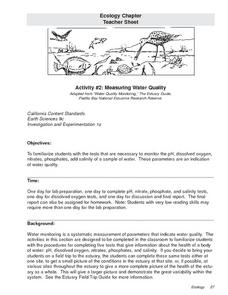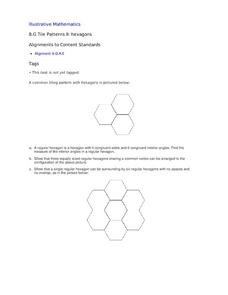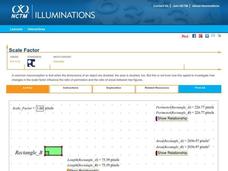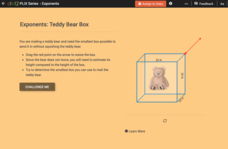Curated OER
Angle Attributes and Measures
Seventh graders explore the concept of angles. In this angles lesson, 7th graders use protractors to measure angles. Students sing an angle song. Students discuss attributes of angles using a two-color plate manipulative.
Curated OER
Measure for Measure: Are You Talkin' to Me?
Students rehearse and perform an exchange from act three, scene two of the play, Measure for Measure, in pairs. They read the lines from the point of view of a different character in the play, and perform for the class.
Curated OER
Measurement: Using the balance
Students use a balance and gram cubes to measure several different objects. They then record their results on a data chart and answer questions about them.
Curated OER
Metric Conversion (From Metric to Standard)
In this math worksheet, students convert metric measurements to standard and back. Students convert inches to cm and mm using an information chart to help.
Curated OER
Use Measurement
In this measurements worksheet, students read the word problems and use the measurements within the problem to solve the six word problems.
Curated OER
GDP and Standard of Living
Seventh graders discuss the GDP and Middle Eastern nations. In this standard of living lesson, 7th graders complete a worksheet during a lecture on the GDP. Students identify the impact of the GDP on a country and reasons for wanting to...
Curated OER
Measuring Water Quality
Students are introduced to the various methods of measuring water quality. In groups, they test various water samples using the different methods, writing them down for pH, oxygen, salinity, and nitrate levels. They use their data to...
Noyce Foundation
Parallelogram
Parallelograms are pairs of triangles all the way around. Pupils measure to determine the area and perimeter of a parallelogram. They then find the area of the tirangles formed by drawing a diagonal of the parallelogram and compare their...
Curated OER
Star Wars: Rays and Angles Edition
Rays and angles and Star Wars? It sounds strange, but it's actually a fun game to help fourth graders get good at measuring and identifying angles and rays with a protractor. Each pair of children chooses which Star Wars character they'd...
Alabama Learning Exchange
Straight Line Motion
Students examine gravity, mass, and friction. In this speed and motion instructional activity, students investigate how straight line motion is impacted by gravity, mass, and fiction as they participate in a hands-on activity.
Teach Engineering
Density Column Lab - Part 1
Mass and density — aren't they the same thing? This activity has groups use balance beams and water displacement to measure several objects. The pupils use the measurements to calculate the density of the objects.
Statistics Education Web
Double Stuffed?
True or false — Double Stuf Oreos always contain twice as much cream as regular Oreos. Scholars first measure the masses of the filling in regular Oreos and Double Stuf Oreos to generate a class set of data. They use hypothesis testing...
Teach Engineering
Slinkies as Solenoids
What does an MRI machine have to do with a slinky? This activity challenges learners to run a current through a slinky and use a magnetic field sensor to measure the magnetic field. Groups then change the length of the slinky to see the...
Curated OER
Chemistry Midterm Practice Exam
A comprehensive practice exam, this resource covers many areas of chemistry. The test includes 71 multiple choice questions on topics such as problem solving, chemical equations, chemical formulas, thermodynamics, acids and bases, and...
Royal Society of Chemistry
Units of Volume
Did you know in the UK a quart is smaller than in America? This explains why a standard unit of measure is necessary for volume. Young scientists learn the similarities and differences between five different units used to measure volume....
American Institutes for Research
Digital Smiles
Explore metric measurement, recording data, and creating an electronic spreadsheet displaying results with your math class. Scholars will measure the length of their smiles, record the measurements, and represent the results on an...
Institute of Electrical and Electronics Engineers
Spring Scale Engineering
After examining how a spring scale works, teams work together to design their own general measurement device. Reading material provides background information, but there is no part of the procedure in which learners handle an actual...
Carnegie Mellon University
Consumer Preferences in Lighting
What is a watt? This tongue-twisting, mind-bending question and others are answered through this lesson on the different lighting options available. With the support of a PowerPoint, teach your physical science class about units of...
Curated OER
Tile Patterns II: Hexagons
After learning that the sum of interior angles for triangles is 108 degrees, take it further to show that the sum of angles in any polygon is the same! Using hexagons, pupils practice finding the measure of the six congruent angles. Make...
National Council of Teachers of Mathematics
Scale Factor
Does doubling mean everything doubles? Learners adjust the scale factor between two rectangles. Using the calculated measurements, pupils investigate the ratios between the lengths, perimeters, and areas of the rectangles.
Carnegie Mellon University
Home Energy Audit
Youngsters make a mental assessment of electricity-consuming appliances in their homes and then evaluate them for the amount of energy consumed. They learn how to use power meters and measure the electrical consumption of several...
Curated OER
Use Google Maps to Teach Math
Capture the engagement of young mathematicians with this upper-elementary math instructional activity on measuring time and distance. Using Google Maps, students first measure and compare the distance and time it takes to travel between...
LABScI
Cell Diffusion and Permeability: The See-Thru Egg Lab
Create a model to study a microscopic phenomenon. The seventh of 12 lessons uses an egg (without its shell) to represent a cell membrane. Using different solutions, learners explore the concept of cell diffusion. They monitor...
CK-12 Foundation
Whole Number Exponents: Teddy Bear Box
Five questions—multiple-choice, fill in the blank, and discussion—make up an interactive that challenges scholars to mail a teddy bear using the smallest box possible without squishing it. A box with movable sides allows mathematicians...
Other popular searches
- Non Standard Measurement
- Standard Measurement Chart
- Standard Measurement Rulers
- Standard Measurement System
- American Standard Measurements
- Math Standard Measurement
- Unit Standard Measurement
- Standard Measurement History
- Using Standard Measurement
- Standard Measurement of Length
- Standard Measurement (Hand)
- Standard Measurementrating=3

























